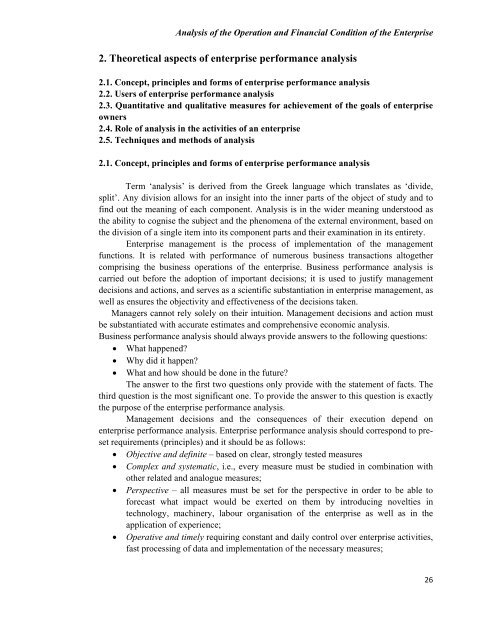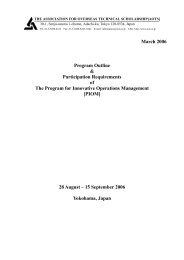Analysis of the Operation and Financial Condition of the Enterprise
Analysis of the Operation and Financial Condition of the Enterprise
Analysis of the Operation and Financial Condition of the Enterprise
You also want an ePaper? Increase the reach of your titles
YUMPU automatically turns print PDFs into web optimized ePapers that Google loves.
<strong>Analysis</strong> <strong>of</strong> <strong>the</strong> <strong>Operation</strong> <strong>and</strong> <strong>Financial</strong> <strong>Condition</strong> <strong>of</strong> <strong>the</strong> <strong>Enterprise</strong>2. Theoretical aspects <strong>of</strong> enterprise performance analysis2.1. Concept, principles <strong>and</strong> forms <strong>of</strong> enterprise performance analysis2.2. Users <strong>of</strong> enterprise performance analysis2.3. Quantitative <strong>and</strong> qualitative measures for achievement <strong>of</strong> <strong>the</strong> goals <strong>of</strong> enterpriseowners2.4. Role <strong>of</strong> analysis in <strong>the</strong> activities <strong>of</strong> an enterprise2.5. Techniques <strong>and</strong> methods <strong>of</strong> analysis2.1. Concept, principles <strong>and</strong> forms <strong>of</strong> enterprise performance analysisTerm ‘analysis’ is derived from <strong>the</strong> Greek language which translates as ‘divide,split’. Any division allows for an insight into <strong>the</strong> inner parts <strong>of</strong> <strong>the</strong> object <strong>of</strong> study <strong>and</strong> t<strong>of</strong>ind out <strong>the</strong> meaning <strong>of</strong> each component. <strong>Analysis</strong> is in <strong>the</strong> wider meaning understood as<strong>the</strong> ability to cognise <strong>the</strong> subject <strong>and</strong> <strong>the</strong> phenomena <strong>of</strong> <strong>the</strong> external environment, based on<strong>the</strong> division <strong>of</strong> a single item into its component parts <strong>and</strong> <strong>the</strong>ir examination in its entirety.<strong>Enterprise</strong> management is <strong>the</strong> process <strong>of</strong> implementation <strong>of</strong> <strong>the</strong> managementfunctions. It is related with performance <strong>of</strong> numerous business transactions altoge<strong>the</strong>rcomprising <strong>the</strong> business operations <strong>of</strong> <strong>the</strong> enterprise. Business performance analysis iscarried out before <strong>the</strong> adoption <strong>of</strong> important decisions; it is used to justify managementdecisions <strong>and</strong> actions, <strong>and</strong> serves as a scientific substantiation in enterprise management, aswell as ensures <strong>the</strong> objectivity <strong>and</strong> effectiveness <strong>of</strong> <strong>the</strong> decisions taken.Managers cannot rely solely on <strong>the</strong>ir intuition. Management decisions <strong>and</strong> action mustbe substantiated with accurate estimates <strong>and</strong> comprehensive economic analysis.Business performance analysis should always provide answers to <strong>the</strong> following questions: What happened? Why did it happen? What <strong>and</strong> how should be done in <strong>the</strong> future?The answer to <strong>the</strong> first two questions only provide with <strong>the</strong> statement <strong>of</strong> facts. Thethird question is <strong>the</strong> most significant one. To provide <strong>the</strong> answer to this question is exactly<strong>the</strong> purpose <strong>of</strong> <strong>the</strong> enterprise performance analysis.Management decisions <strong>and</strong> <strong>the</strong> consequences <strong>of</strong> <strong>the</strong>ir execution depend onenterprise performance analysis. <strong>Enterprise</strong> performance analysis should correspond to presetrequirements (principles) <strong>and</strong> it should be as follows: Objective <strong>and</strong> definite – based on clear, strongly tested measures Complex <strong>and</strong> systematic, i.e., every measure must be studied in combination witho<strong>the</strong>r related <strong>and</strong> analogue measures; Perspective – all measures must be set for <strong>the</strong> perspective in order to be able t<strong>of</strong>orecast what impact would be exerted on <strong>the</strong>m by introducing novelties intechnology, machinery, labour organisation <strong>of</strong> <strong>the</strong> enterprise as well as in <strong>the</strong>application <strong>of</strong> experience; Operative <strong>and</strong> timely requiring constant <strong>and</strong> daily control over enterprise activities,fast processing <strong>of</strong> data <strong>and</strong> implementation <strong>of</strong> <strong>the</strong> necessary measures;26
















